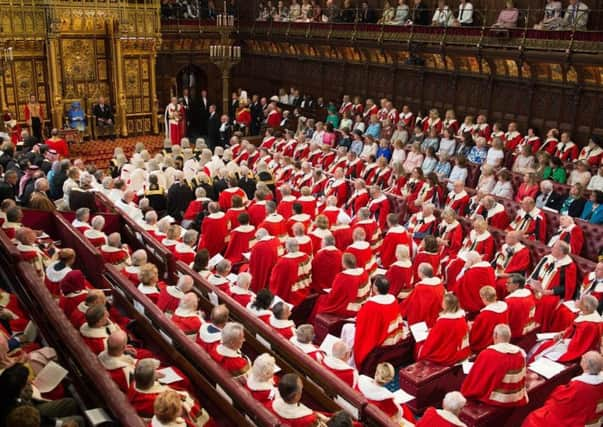Bill Carmichael: After Brexit, it's time to abolish the House of Lords


Given these striking similarities, there is little surprise that the ermine-clad members of the House of Lords are preparing to go into battle on behalf of their ideological soulmates in Brussels in an attempt to thwart the will of 17.4 million British citizens expressed in the biggest exercise in democracy in our entire history.
Peers are so out of touch with the concerns of ordinary people that I suspect many of them have absolutely no idea of the whirlwind of popular fury they will whistle up if they make good on their threat to block Brexit.
Advertisement
Hide AdAdvertisement
Hide AdPart of me wants this to happen – because the House of Lords would in effect be signing its own death warrant. Hurrah and good riddance! Any move to defy the House of Commons, where democratically-elected members voted last February by a stonking 372 majority to begin withdrawal from the EU, would be an unprecedented constitutional outrage. But at least it would undoubtedly be the catalyst to complete the process of reform that began over 100 years ago and still remains unfinished.
It was back in 1911 when the then Liberal government introduced a proposal to replace the House of Lords with a second chamber “constituted on a popular, rather than hereditary, basis”. It never happened. Since then, members of this privileged establishment have fought every inch to maintain a grip on their outdated and entirely underserved entitlements – and with considerable success.
Astonishingly, today, there are still 92 hereditary peers, there simply by reason of their birth, and certainly not on merit. When one of them dies, the others hold an election between themselves to choose another member of the aristocracy to join them. It would be funny if it were not so serious.
There are also 26 senior Church of England clergy – there for historical reasons that are entirely incompatible with a modern pluralistic society.
Advertisement
Hide AdAdvertisement
Hide AdMembership of the House of Lords is highly prized. Most of them are elderly – average age 69 – about 75 per cent are men, 34 per cent previously worked in politics, and almost half have home addresses in London and the Home Counties. So much for diversity!
The House of Lords has been described as “the best day care centre for the elderly in London”. As well as the subsidised restaurants and bars, there is also a £300 a day tax-free allowance that carries no obligation to do any work. Indeed, according to former Lords Speaker Baroness d’Souza, only a tiny core of peers actually do any work and there are “many, many peers who contribute absolutely nothing but who claim the full allowance”. She told the BBC last year that one peer keeps a taxi running outside the House of Lords while he pops in to claim his £300 before tottering straight out again.
According to the Electoral Reform Society 63 peers failed to speak a single time in the chamber, vote on bills or serve on a committee during the entire 2016/17 session – yet they claimed expenses of £1,095,70.
But what has elevated the House of Lords from embarrassing feudal relic to international laughing stock is the sheer size of the thing. Each successive government has packed more and more cronies and rich party donors onto the red benches so now the whole thing is bloated beyond parody. It now has about 800 members, making it the second biggest legislative chamber in the world after the Chinese People’s Congress.
Advertisement
Hide AdAdvertisement
Hide AdTo put these numbers in perspective the equivalent upper house in the US, the Senate, has just 100 members – two elected from each state.
Is anyone seriously suggesting we need eight times more law makers than America to deal with a population about a fifth of the size? It is utterly absurd.
Both the House of Lords and the European Union are intolerable blots on our democracy. My fervent hope is that once we free ourselves from the yoke of the EU, we can turn our attention to abolishing that bastion of unmerited privilege that is the House of Lords.
Only then will we be able to call ourselves a proper self-governing democracy.